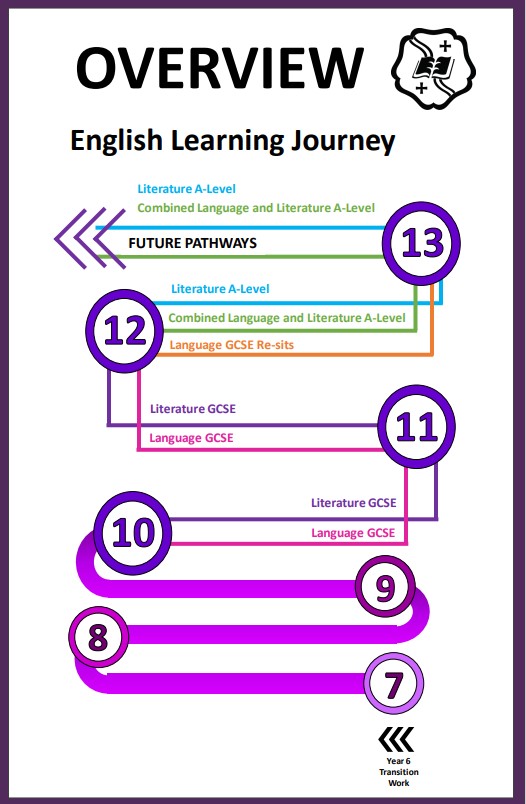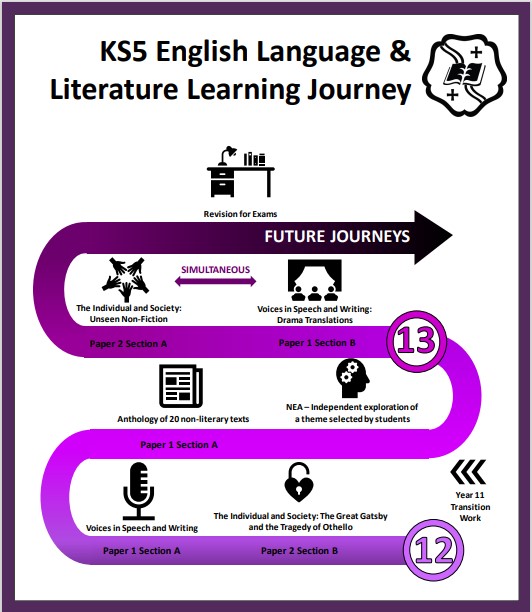English holds a central place in the
curriculum as language is power: it underpins all learning. We aim for our
students to develop critical awareness, the ability to craft their writing, an
appreciation of literature, and the confidence to articulate their ideas. We
use language and literature to explore and nurture life skills such as
resilience, self-expression and creativity. Students will become more empathetic
and tolerant through encountering a range of texts that allow students to think
beyond their own time and place. Through the subjects offered by the English
department, our students will be empowered to explore, understand and question
the world, people, and themselves.
The English Key Stage Three curriculum has been developed to not only prepare students for their studies at Key Stage Four and Five, but also to kindle a love and passion for the subject that will last students a lifetime. Encompassing a huge range of topics and skills, students will be reading classic literature such as Shakespeare to modern classics such as Private Peaceful and Woman in Black. We encourage and enable our students to be critical, creative and conceptual.

The English Language course we study has been designed to inspire and motivate students, providing appropriate stretch and challenge whilst ensuring, as far as possible, that the assessment and texts are accessible to the full range of students.
The specification enables students of all abilities to develop the skills they need to read, understand and analyse a wide range of different texts covering the 19th, 20th and 21st century time periods as well as developing their ability to write clearly, coherently and accurately using a range of vocabulary and sentence structures.
Exam Board: AQA
Qualification Title: English Language
Qualification Specification Code: 8700
Qualification Webpage: Click here to visit the AQA webpage for the specification.
English Language is a mandatory course to study at GCSE because it is crucial for every other subject that you study, and for your career path.
Students will need Grade 4 or above in English Language to continue in further education.
AO1:
Identify and interpret explicit and implicit information and ideas.
Select and synthesise evidence from different texts.
AO2: Explain, comment on and analyse how writers use language and structure to achieve effects and influence readers, using relevant subject terminology to support their views.
AO3: Compare writers’ ideas and perspectives, as well as how these are conveyed, across two or more texts.
AO4: Evaluate texts critically and support this with appropriate textual references.
AO5:Communicate clearly, effectively and imaginatively, selecting and adapting tone, style and register for different forms, purposes and audiences. Organise information and ideas, using structural and grammatical features to support coherence and cohesion of texts.
AO6: Candidates must use a range of vocabulary and sentence structures for clarity, purpose and effect, with accurate spelling and punctuation.


Paper 1 (50%): Explorations in creative reading and writing
1hr45
80 marks in total.
The aim of this paper is to engage students in a creative text and inspire them to write creatively themselves by:
• in section A, reading a literature fiction text in order to consider how established writers use narrative and descriptive techniques to capture the interest of readers. This section is worth 40 marks.
• in section B, writing their own creative text, inspired by the topic that they have responded to in section A to demonstrate their narrative and descriptive skills in response to a written prompt, scenario or visual image. This section is worth 40 marks.
Paper 2 (50%): Writer’s viewpoints and perspectives
1hr45
80 marks in total.
The aim of this paper is to develop students’ insights into how writers have particular viewpoints and perspectives on issues or themes that are important to the way we think and live our lives. It will encourage students to demonstrate their skills by:
• in section A, reading two linked sources from different time periods and genres in order to consider how each presents a perspective or viewpoint to influence the reader. This section is worth 40 marks.
• in section B, producing a written text to a specified audience, purpose and form in which they give their own perspective on the theme that has been introduced to them in section A. This section is worth 40 marks.
NEA: Spoken Language Assessment
All students will give a short speech on a topic of their choice, which will be agreed with their class teacher. This will be performed in class and recorded to be sent to the exam board.
This is a marked component and students will receive a grade: fail, pass, merit, distinction, however this does not affect students overall English Language grade.
Writer – Creative writer, travel writer, children’s writer…
Journalist
Careers working within PR, marketing, advertising
Teacher – English Language specialist
Linguistic specialist
Translator
Copy-writer
Editor
Solicitor/Lawyer
Graphic Designer
Politician
Brand Consultant
Motivational Speaker
Researcher
Librarian
Jobs within publishing
Think about all the
times you tell someone about something. In effect, you are telling a story. Why
do you tell the story in the way you do? What do you keep in and why? What do
you leave out and why? This applies not just to the way we tell stories, but
how we present our ideas and attitudes. Many factors affect how people tell
stories or present their ideas. Building on the knowledge and skills developed
in your GCSEs in English Language and English Literature, we will analyse in
depth and detail how and why people tell stories – in the broadest sense – by
looking at a variety of fictional and non-fictional texts including
Shakespeare. You will be expected to engage in a considerable amount of
independent reading and be willing to take the initiative when exploring how
writers use language to present their ideas and attitudes.
Provide students with the opportunity to explore an academic range of texts and skills that will help with careers and higher study in English/Film/ Media and the wider curriculum. Educate students to be able to engage critically with texts on an exploratory and analytical level. Support students in being able to manage time and organisational elements with research, essay writing and extended projects (in particular the NEA). Inspire students to become adults who are curious about the world and willing to challenge ideas. Promote independent learning in the subject area and beyond. Enable students to become sophisticated and effective communicators. Using the curricula, introduce new concepts; build on prior learning to revisit and improve skills; promote the development of all three literacy strands; explicitly promote stretch and challenge through the years. All this is underpinned with personalised assessment and targeted feedback, aligned with key learning objectives. Inspire and enhance student understanding further by offering extra-curricular opportunities, with a focus on extending knowledge and experience, and encouraging personal investigation. Provide personalised advice and guidance to support students’ wider learning and aspirations beyond KS5.
Exam Board: Edexcel
Qualification Title: English Language and Literature
Qualification Specification Code: 9EL0
Qualification Webpage: Click here to visit the Edexcel webpage for the specification.
Standard Sixth Form
entry requirements plus a strong enjoyment of independent reading and writing.


Apart from degrees
in English Literature, and Linguistics, this course will also support your
understanding and appreciation of whatever subject you choose to study. Most
obviously, the course will suit students interested in pursuing the following
careers: the Creative Industries, Advertising, Marketing, Public Relations, and
Journalism. However, the course will develop your ability to write and think
with greater understanding – a skill that underpins everything you will do in
whatever course or career you choose.
Mrs Guerrini
Owned by: MDS | Last Published: 20/09/2019 09:53:36 | Next Update: N/A